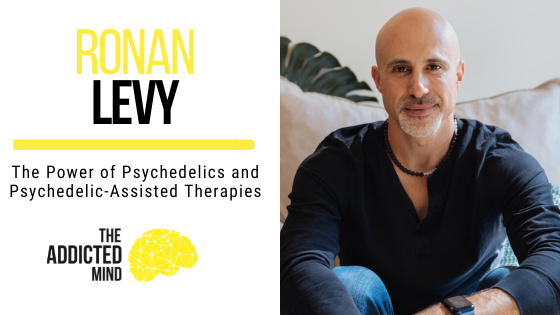There’s a rising popularity in the field of psychedelics as it relates to addiction treatment and healing trauma. But aren’t psychedelics addictive?
Ronan Levy, co-founder of Field Trip Health, a company with a mission to heal the sick and better the well through psychedelics and psychedelic-assisted therapies, explains the role of psychedelics in healing trauma and addiction treatment and recovery.
What Are Psychedelics?
Psychedelics are a class of drugs or medicines that are psychoactive and psychotropic, which affect your brain chemistry as well as your perception of reality, at least temporarily.
Examples of psychedelics include LSD, psilocybin or magic mushrooms, MDMA (ecstasy), and ketamine, which is actually an FDA-approved anesthetic.
The Risk of Using Psychedelics
LSD, psilocybin, and other tryptamines of that nature are non-addictive. In fact, they’re anti-addictive.
According to Ronan Levy of Field Trip Health, there’s no overdose amount for psychedelics It’s virtually impossible to overdose on psychedelics if and when done in a proper therapeutic environment with medical professionals or psychotherapeutic professionals. The risk of the so-called bad trip or going crazy is virtually negligible. Those experiences can happen. But when done in the right context, those experiences don’t usually happen.
These are molecules that are safe and potent. There are NYU studies suggesting that a single psilocybin-assisted therapy experience, which is basically taking about 25 milligrams of the active ingredients psilocybin, with a therapist present for about four or five hours, can lead to antidepressant effects that lasts for five years or longer.
What Happens to The Brain During a Psychedelic Experience
There’s a massive serotonin release in the body during a psychedelic experience. Serotonin is one of the feel-good hormones in our body that’s why people who take it feel better almost immediately.
Psychedelics, particularly ketamine, is such powerful medicine for acute suicidal ideation. It breaks the cycle of thought very quickly, and people feel better almost immediately.
One of the psychotropic effects is that people often find they can revisit past experiences or past traumas from a different perspective and see it from a different lens. What months and years of cognitive therapy or other therapies can do basically can just happen in a single session or two of using psychedelics.
Lastly, we see that the brain starts to grow new neural synapses. So if you’re experiencing depression or other mental health conditions, the cells that connect your neurons and help them communicate, start to wither and fade. Following a psychedelic experience, these cells start to grow back.
If you want to learn more about The Power of Psychedelics and Psychedelic-Assisted Therapies, check out Episode 176: The Power of Psychedelics and Psychedelic-Assisted Therapies with Ronan Levy.

